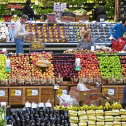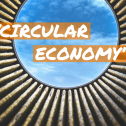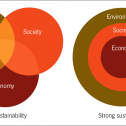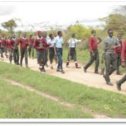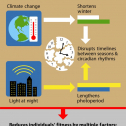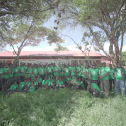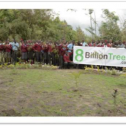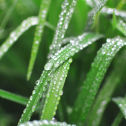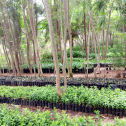Student Blog
-
Supermarkets strategically make customers buy more to the extent that Black Friday stores are envious. However, who is to blame for the food waste that follows, consumers or supermarkets? To find out, GSA Intern Ava article dissects the findings of insightful research. morein Students on 10/11/2021 12:18 PM
-
New GSA Student intern Haen Jennie Cho explores the concept of a 'Circular Economy' and why it's so important in the modern world. morein Students on 03/25/2021 10:39 AM
-
Environmentalism, sustainability, and social justice are terms often used in relation to and connected with each other. In this post I talk about each of these terms and my relationship throughout my life with them. morein Students on 03/12/2021 01:25 PM
-
Previously, when I thought of a “perfect” environmentalist, I pictured someone who composts every day, leaves zero waste, bikes and walks everywhere, and has a minimalist closet of only thrifted clothes. But I realize now that just like everything else in life, achieving “perfection” is impossible. Even the ideal environmentalist I just described is not perfect. Read on to see why imperfections make better environmentalists. morein Students on 03/05/2021 09:00 AM
-
In Part V, the final part of this blog series, we discuss Sam’s future aspirations, along with how individuals can help support tree planting initiatives. morein Students on 02/22/2021 09:30 AM
-
Don’t let the seemingly long and fancy word “photoperiodism” throw you off from reading this blog! Though it may sound complex and full of syllables, the definition is simple. ‘Photo’ means light and ‘period’ means length, so together the word photoperiod just refers to how much sunlight plants get per day (how long the daylight is). ... morein Students on 02/17/2021 10:01 AM
-
In Part IV of this blog series, we learn more about the #greenschoolsinitiative, and the challenges and successes of this enormous tree-planting project. morein Students on 02/15/2021 09:09 AM
-
In Part III of this blog series, we learn about the 8 Billion Trees project, and the impact of Sam Mutua’s work with students in Kenya. morein Students on 02/08/2021 09:30 AM
-
Stormwater runoff is a huge issue for water systems, people, plants, and animals. Usually, runoff is filtered by soil before spreading. However, many watersheds (water bodies that drain into several rivers and streams) have become urbanized, meaning these locations now contain concrete, which is an impervious surface. Thus, stormwater in these locations pick up pollutants such as fertilizers, bacteria, pesticides, and petroleum by-products from cars and spread these pollutants across land and into rivers, polluting these areas. Rain gardens are a great, cost-effective way to reduce runoff! Read on to learn how you can bring them to your community! morein Students on 02/05/2021 09:00 AM
-
GSA Intern Ava interviews Sam Mutua, an everyday sustainability hero who runs the Konza Greens Nursery project in Kenya - a program that plants trees and educates youth in partnership with 8 Billion trees. In Part II of this blog series, Sam Mutua shares his thoughts on the challenges of climate change and environmental destruction, as well as some ways to address them. morein Students on 02/01/2021 09:30 AM
Our high school student members share their green experiences, tips, concerns and stories.
Learn more!
Check out the
Go to• School Professional Blogs
Student Newsletter
------------------------------------------Go to
• School Professional Blogs
• Success Stories
• All Member Blogs
• News & Announcements
Become a Blogger
If you would like to become a GSA Blogger, please review our guidelines and process here.
